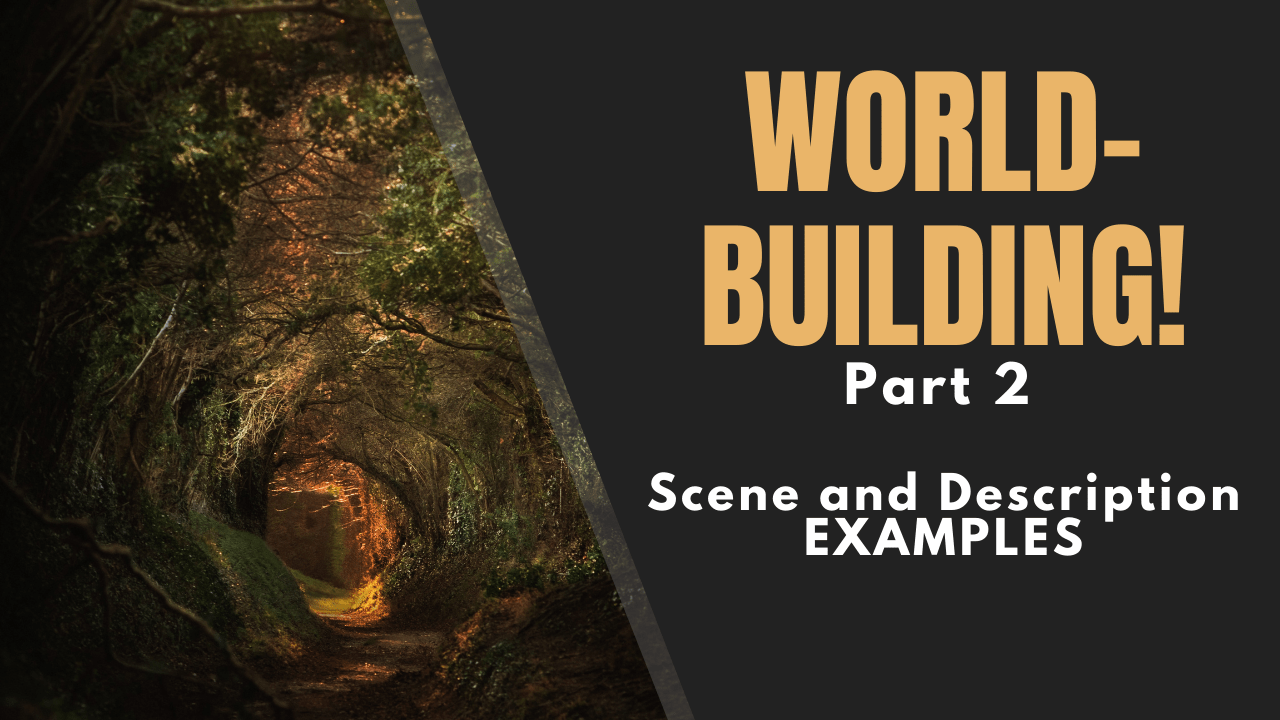Latest Writing Video! |
|
Last week, I discussed worldbuilding, especially techniques that have helped me overcome my worldbuilding problems, as these are the techniques I have the most experience with. Yet, I failed in one major respect in that article as I didn’t provide written examples of these scenes, rather I only discussed the scenes and their core elements. It was a missed opportunity, but it won’t be missed now. In this post, I will be writing example scenes and underlining why their simplicity goes a long way in worldbuilding. Let’s begin! Pin for Later!NOTEThese examples surround the different scene and description ideas I talked about in the last educational episode of Writing Today. If you want to read that blog post, you can find it here. If you want to watch a video I made, you can find that here. 1. Main Character Overhears ConversationEXAMPLE 1 The streets were a mess of cars that few were still struggling to start. As I walked between them, I could hear the curses and prayers of the frantic drivers. What most interested me was the snippets of conversation the clusters of drivers were having. “...two, a boy and a girl,” one woman said. “Both are probably hiding under their beds waiting for me to come home.” “Weren’t they going to send people to fix the cars?” an angry voice asked. “I heard the governor, hell, even the president say something about that.” “Don’t be an idiot, since when has the president kept a promise yet?” the third countered. “If we want to make it home to our loved ones, we’re just going to have to walk down the highway.” “In this heat, you must be crazy!” Despite the uncomfortable weather, many were doing just that, while most preferred to stay with the false hope that there would soon be a convoy of tow trucks filled with car mechanics and charged car batteries coming over the horizon. Yet, all I could see were cars backed up till the bridge. Whether we waited or walked, we had plenty of time to think about why all the electronics were failing. EXAMPLE 2 The vents were a lot more cramped than I thought they would be. Instead of crawling slowly forwards like a worm, I wanted to slither quickly through them and be out in an open room again. Of course, if I moved any faster the sounds of my movement could be easily heard by the guards that patrolled the building, who would turn off their safeties and pepper the vents with bullets before I knew it. It was this thought that helped me accept the discomfort A few minutes later I came to a complete stop. I heard voices, words being hissed in an urgent whisper, but the speakers were close enough to a vent for the words to echo to my ears. I thought I made a mistake and someone heard me. “...will be executed,” the one voice said. I could not see the speaker, but the voice sounded weaselly, so that’s the kind of face I pictured. “Or worse…you know how the boss is.” “The boss has bigger problems,” a woman snapped. “Besides, it’s just a peek. Aren’t you curious about what’s in the box?” “The only box I’m concerned with is the one on my pay check with the numbers in it. Last I checked, it was enough to keep me from snooping.” “Well, then just a closer look.” There was a pause. “Is that gold?” the weasel asked. “Yeah…that’s gold framing, old gold…now I really want to look inside.” I held my breath, listening for what happened next. “Stop, leave it,” the weasel said. “I don’t know if the boss would kill us for being here, but she would definitely kill us for opening the damn thing. C’mon, let’s get out of here.” The woman with him didn’t argue, or perhaps she changed her tune. Their steps faded. After a moment of silence, I crawled on. There was no time to ponder the conversation between art thief’s goons, I had a painting to get back. SHORT DISCUSSION As I said in my article, these are the kinds of scenes that I like to write about the most. I feel that they can lend some personality to the faceless characters that fill the background. It makes the world feel more alive, as people have their own desires and personalities, these overheard conversations being an excellent opportunity to present both. Of course, these conversations can serve other purposes. In the first scene example, the overheard conversation is adding to the world, describing the emotions and thoughts of the general population. It shows that they are confused, angry, scared. It adds to that darkness of the situation. In the second scene example, the conversation could be used to describe characters the protagonist will encounter later, adding to their personality or hints at what will come next in the story. There are many opportunities to play with the scene idea, but the core element is that it makes the world more immersive and alive. 2. Narrative Ramble/Exposition ExamplesEXAMPLE 1 The store had seen better days; better days under someone else’s care. When I found the place two years ago on the market, it was spotless. The tables were freshly varnished, cleaned professionally. Not only could I eat off them, but my reflection in them was also so clear I could do my makeup with some confidence. The door didn’t squeak horribly, the windows didn’t have that aged fog and there wasn’t a smell that made your nose hairs curl. It, in essence, was a dream come true. A place that already looked great, so its potential was limitless. Within a month, I had the shelves and displays filled with baked goods, I had the smell of coffee drifting through the air and attracting customers who walked by the store. I was showered with compliments and the money was good. It was work keeping the place going, but easy work. That was then, this is now. No matter how hard I polish the tables, my reflection is always a warped mess. No matter how much coffee I make, the smell of the store overpowers it in a second. I didn’t need to read minds to know what the people thought when they glanced inside as they walked by. “I used to like this place, what the hell happened?” I don’t know, I just don’t know. EXAMPLE 2 Jake is…was my best friend. We met in high school and from that first meeting he took it upon himself to keep me from getting into too much trouble. He must have seen that anger in my eyes, because whenever I was about to start a fight with some punk, he would pull me back and keep the peace. He knew what was best for me even then. The years went on and when we got out of school he stuck to me like glue, even when I took the road they all said I would. The real world required people like me, ambitious people who did bad things. It gave the politicians ammo, it gave the common people gossip. The odd store robbery, the occasional hit job…never killing anyone, but certainly making sure they wished they were dead. I was a perfect fit for a gang, I’m lucky a good one got its claws in me. The money is good, the people are alright. Jake couldn’t change me and he sure as hell couldn’t stop me, but he went out of his way to make sure I didn’t cross that line. He made sure that I never pulled the trigger or punched so hard the mark would never get up. Sometimes I didn’t know if he was my guardian angel, or everyone else’s, but I didn’t mind either way. When everyone else cut ties, he didn’t even think about it. Until I crossed that line. I wanted to kill the mark, but I just expected something to hold me back. Thing is, only Jake could have stopped me and he wasn’t there. That was all me. That’s one more tie cut. Without Jake, there’s nothing to keep me from falling the rest of the way. SHORT DISCUSSION In the first example, I use narrative rambles to talk about a place and in the second example, I talk about a person. Both scenes describe a fall from simpler, easier times. When it comes to world-building, you can use narrative ramble to literally build the world, as I did in the first example. It describes a cafe’s fall from the good times of its opening to a time where the place has lost its beauty, its soul. The place is in poor condition and the owner is lost, unsure of how it got that way. Narrative rambles are a great way to set the scene, in my opinion, but like all these world-building methods it should be used sparingly. From then on, it is best to tell the story of what happens next. The same applies to the second example. The second example describes a rise and fall of a gangster who feels like they have crossed the line and regret their actions. It sets the scene, establishes a similar sense of hopelessness, but the story is ready to move on. 3. Establishing Large Scale/Political ConflictEXAMPLE 1 “W-Who are they?” Simon asked in a whisper, shrinking deeper into the shadows. The ominous figures ahead of them shattered his confidence. “They don’t look friendly.” “They’re not, but we will be fine as long as we don’t get in their way,” Sarah replied. Sarah took his hand and pulled him forward, sticking to the pavement, eyeing the soldiers as they passed. Their masks gave no hint to their intentions, so she focused her attention on their body language. Left arms at rest by their side, the right arms propped up by the guns slung over their shoulders. The soldiers were simply standing, waiting. Not a twitch, not a word said. They could have been statues, as no hint of warm humanity radiated from them. These were brainwashed machines in Sarah’s eyes and monsters in Simon’s. “Those are his soldiers,” Sarah explained once enough distance was put between them. “Don’t let the stiffness fool you, they see and hear better than you think with those masks on. He has countless soldiers, but it would take only four or five to wipe out the rebellion if they knew where the rebellion was hiding.” “Are you serious?” “I didn’t say this would be an easy fight,” Sarah muttered. “I just said we could win.” EXAMPLE 2 As it stands, the relations between the Eastern Kingdom and the Western Kingdom are stable. Borders are maintained, peace summits are often held, everyone follows the rules when in each kingdom. To guarantee the status quo, the leaders of each kingdom partake in friendship rituals twice a year. It is these rituals that truly ensure peace. A peace summit can go badly, someone from another kingdom could break the law, or cross the border illegally, but the leaders will not go to war over such matters. Those are problems for law enforcement to rectify, not highly trained soldiers. Yet, one snub during either ritual and soldiers would mass at the border before midnight. These kingdoms hate each other and the only reason they don’t go to war is because of those rituals. Pride brought about by tradition. Nobody questions it as the times are peaceful, but if you have enough brains, you see it for what it really is. A political powder keg waiting for a single spark to relieve the tension. SHORT DISCUSSION I like having larger conflicts in my world space. I feel that when I’m writing grander stories that I need grander settings to match. Of course, when one has a story that has great consequences, it makes sense that the entire world space plays a part. Of course, political conflict doesn’t have to be a core element of your story. Sometimes, political conflict is relatable enough that the reader can then understand the tensions of the many characters that the protagonist encounters. A lot of people can be affected by political decisions and sometimes in big ways. For example, if you were to write a story set in a time when a political conflict of some kind takes place, such as the Great Depression or even back to the time of feuding medieval empires, then having such world-building moments such as these would be great to have. In the first example, I show products of political conflict; foreboding soldiers and talk of rebellion. In the second example, I make a more unbelievable scenario, but one that still highlights the tension that no doubt many people in this world feel; that war could happen at any moment. 4. Mannerisms and TraditionsEXAMPLE 1 “Wait, knock two times,” Kevin said quickly. “What? “It’s customary to knock two times if you are a visitor,” Kevin explained. “Three times if you are someone important, like a fireman or a police officer.” “What about one knock?” “Door-to-door salesperson.” EXAMPLE 2 “I can’t wait for tomorrow,” Jean said, her head already in the clouds. Tomorrow was to be the Great Tree day, where the town would gather for a festival around the giant tree in the center of town. “It’s been a long time since I had good cotton candy...or a toffee apple.” “Don’t know how you can like that sort of thing,” Sven muttered. “Haven’t you grown out of that kid stuff yet?” “Oh, so you’re going to listen to the speeches and watch the history play with the rest of the adults?” “Well…no…” “You should,” the teacher said, overhearing our discussion. “The Great Tree’s history is your history. You would do well to listen to the stories, the speeches and the play, there’s a lot of wisdom to be gained.” “More like time to be wasted,” Sven thought to himself, avoiding the teacher’s beady, condescending eyes. SHORT DISCUSSION Mannerism and traditions come in all forms. It could be the special holidays that take place in your world or it can be the various actions characters make. Some are simple, such as how characters greet each other. Characters could shake hands, bow, salute or exchange any gesture you want them to. Of course, this extends beyond greetings. You will find there are mannerisms for practically everything and depending on the culture, some can be truly unique. Whether you reference real culture or devise an etiquette for your fictional world, it will go a long way in making your world immersive. Society needs these nuances to make it that much more believable. A reader will struggle to be invested in a world lacking depth. Mannerisms and traditions might be something you use rarely, but showing culture in your story is an effective method nonetheless. 5. Establishing ResourcesEXAMPLE 1 The knight lifted her sword off the table, eyeing it from hilt to tip. At a glance, the sword appeared to be a simple, steel design. Yet, the more she examined it, the more nuances she discovered in its make-up. “This sword…dwarven?” she asked, holding it up for the captain of the guard to see. “Hmm, yes, I think so,” the captain said, stepping forward while he secured the straps on his gauntlets. “Good eye.” “How did this end up here?” The captain must have taken her expression as one of disdain rather than curiosity, as he immediately jumped to explain what it was she was holding. “It’s a good sword! Dwarves spend years mining the finest ores from the toughest stone, then years smelting it into near-unbreakable steel. That sword will cleave through the toughest shield, count on it.” The knight nodded. She was familiar with the metals the skilful dwarves worked with, but she was more curious as to how it ended up among the swords in the barracks. It mattered little. Knowing what kind of sword it was made it easy for her to claim it. It hung from her hip as she followed the captain outside to prepare the defences. EXAMPLE 2 The workspace was almost clinical. Everything was spotless and cold, technology covered every shelf and tabletop, the only natural element being the engineers and programming wizards who tinkered or tapped away at their keyboards. The conversation was sparse because this was the testing phase. All that concerned them was pressing start, running the test, noting the result and resetting the experiment. It was slow, boring even, but necessary. Only these geniuses could decipher what kind of technology was used in that ship. Their answers could help humanity leapfrog straight into the space age, so they were given all the allowances they desired, as long as they kept working. “The material is not too dissimilar from reinforced polymer,” one said. “Yet it is several times stronger and lighter,” the other replied. “It might be the same stuff, but the process…they…used was certainly beyond anything we’ve created.” “Do you think we can reverse engineer it?” “If only it were that simple…keep running the tests, we will see afterwards what comes next.” There was excitement in the air, yet the ludicrous amounts of government funding pouring in had nothing to do with it. Every brainiac with an interest in politics was present, then every brainiac interested in money, shortly followed by the experts who could be coerced. When working in such a department, finding the people for the job is that easy. SHORT DISCUSSION In example 1, I highlight a physical resource and its significance. It adds depth to the world space. One can easily have a character pick up a sword and march off to battle, but one can make it more interesting if they talk about how the sword was made, or who made it, or any small detail that describes the world space out of sight. In example 2, I talk about a resource that isn’t physical; intelligence. When it comes to genres such as science-fiction, one of the biggest elements of the story you want to try to maintain is believability. A story that poses ludicrous ideas without many foundations easily loses believability, which in turn makes several parts of the story less thrilling. Yet, if you underline the brilliance of the inventors, or how they got such resources, to begin with, it immediately lends some semblance of believability. One can then understand the interest in such a goal and the willingness to study/pursue it. ConclusionAfter the last post I made, I thought that by writing examples I could better convey the different types of scenes and how they can add to a story.
Whenever I feel my world doesn’t feel ‘alive’ or it lacks any interesting elements, I use these world-building ideas to make it better. It makes sense, as when I am creating a new character for a story, I don’t want to introduce a bland character. I want to give them personality, by either giving them a prominent quirk in how they act/speak, perhaps even an interesting goal. I need to approach worldbuilding the same way, by giving my world space personality, giving it history and characters that make it memorable. If you are anything like me, then slowing down in the plot to add these world-building details is difficult. It easily slips one’s mind. Yet, I hope the advice I gave in the previous post and the examples in this one help you overcome the obstacle. Thank you for reading and as always, Good day, goodnight and happy writing!
0 Comments
Leave a Reply. |







